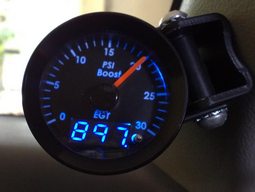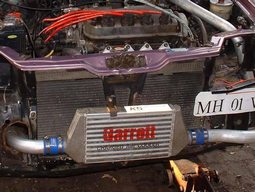
Points to consider before TURBO-Charging your car
So, you want to turbo-charge your car and you dream of sub-seven second dashes to 100km/h. There are many hatchbacks and sedans in India that have had successful after-market turbo jobs, but each one of them required a huge investment in time and money. Adding a turbo-charger to your car is a serious modification and lack of knowledge, expertise and appropriate parts can lead to disaster. This compilation covers some things to look for before you buy a turbo and the simple ways to check a turbo install job.
Before you choose a turbo make sure the following is checked:
- That the ECU has the ability to handle turbo-boosting.
- That the injector has enough size to supply extra fuel.
- That you use fuel of the proper quality, pressure and volume.
- That knock sensing apparatus is equipped.
- That there is available space in the engine compartment.
- Whether the compression ratio has been brought down to at least 8.5.
How to choose the right turbo:
- Pick one that is designed for the engine capacity of your car. The chart below can be used as a rough guide.
- Make sure that the exhaust side (or turbine trim) is designed for your engine capacity and that the intake side (or compressor trim) is larger.
- High-quality turbos have ball bearings and water-cooling while lesser ones use roller bearings and have no water cooling.
- Does the turbo have an external/internal waste gate and at what boost does it open?
Here is a chart to help you choose your turbo trim, assuming you know how to calculate your engine’s CID:
Engine Displacement Compressor Trim Turbine Trim Turbine Hsg
60-100 CID T3-50 Trim T3 Standard .36/.48
100-150 CID T3-Super 60 T3 Standard .48/.63
150-200 CID T3-Super 60 T3 Standard .63/.82
200-250 CID T4-S3 Trim T4 "O" Trim .58/.69
250-300 CID T4-V1 Trim T4 "P" Trim .69/.81
300-350 CID T4-V1 Trim T4 "P" Trim .81/.96
350-400 CID T4-H3 Trim T4 "P" Trim .96/1.30
400-450 CID T4-H3 Trim T4 "P" Trim 1.30
(Source: Toysport)
 Additional parts you will need:
Additional parts you will need:
- An intercooler, as the intake temperatures will be above 40°C.
- A radiator able to handle higher engine temperatures.
- Exhaust pipes the size of the exhaust port on the turbine.
- A BOV if you do not want to stress the turbo.
- A rising rate fuel pressure regulator to linearly increase fuel pressure, though this may not be required if you have a good fuel pump and an aftermarket ECU.
- Forged internals are required for anything above 6 PSI, though some stock internals can handle higher boost – check with your tuner.
- Ported and polished heads for increased power.
- A milder cam to reduce valve overlap.
How to check your install:
- The easiest way to check is by applying the throttle while in second gear and letting the engine reach 60% of the rev range. If your ECU's warning lamp does not come on, you are ready to go.
- There should be no smoke from the exhaust.
- Make sure your water temperature needle is at its usual position and does not climb rapidly.
- There should be no sudden sucking noises from the turbo. This noise means you are running a small turbo.
- Lift you foot from the accelerator and check to make sure your BOV engages.
- Learn how to slip your clutch. It is almost mandatory for driving turbo cars.
Things that will harm your turbo:
- Contaminated or dirty oil.
- Lack of lubrication.
- Low oil pressure.
- Blocked air filters.
- Collapsing plumbing.
- Undersized plumbing.
- Prolonged engine idling.
- Over-fueling the engine.
- Hot engine shut-down.
- Improperly installed gaskets.
- Nuts & washers dropped into the exhaust system.
- Higher-rated spark plugs (for the engine).
 Things to keep your turbo running smoothly:
Things to keep your turbo running smoothly:
- Replace engine oil frequently.
- Keep the air filter clean and unrestricted.
- Check that the plumbing from the air filter is free of holes.
- Check that plumbing connections are tight to prevent leaks.
- Warm up the engine for two to five minutes prior to driving.
- Let the engine idle for approximately 2 minutes prior to shut down.
Recommended Read:
Related Threads












